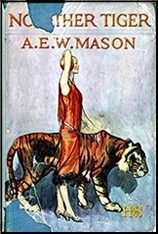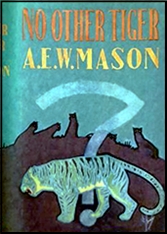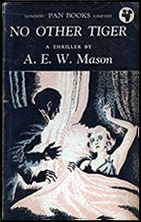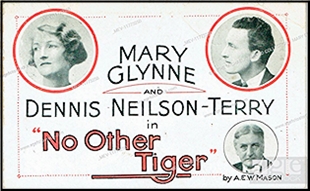Sat 18 Apr 2020
A Mystery Review by David Vineyard: A. E. W. MASON – No Other Tiger.
Posted by Steve under Reviews[10] Comments
A. E. W. MASON – No Other Tiger. Hodder & Stoughton, UK, hardcover, 1927. George H. Doran, US, hardcover, Doran, 1927. Reprinted in the UK several times in paperback. Stage play (see bottom photo): First produced at Opera House, Leicester, 3rd December and St. James’s Theatre, 26th December 1928.

A. E. W. Mason, bestselling author, playwright, spy, producer, and literary bon vivant, is best remembered today for penning one of the classics of the adventure genre, the often filmed The Four Feathers, but to modern mystery readers he is equally known as the creator of Inspector Hanaud, who with his “Watson,†Mr. Ricardo, appeared in popular novels such as The Prisoner in the Opal, They Wouldn’t Be Chessmen, and his most admired classic The House of the Arrow, so it may come as some surprise that his best mystery novel, a fast paced tale of adventure, revenge, madness, mystery, and atmosphere not only doesn’t feature Hanaud, some don’t even classify it with his mystery novels.
No Other Tiger opens in Burma.
Within hours of his arrival in Burma a man is killed, Maung H’la, who is apparently mauled by a tiger,and true to his nature Strickland takes up his weapon for a dangerous tiger hunt with the local hunter wounded, a hunt where Strickland finds no tiger, but a savage man, a European … “no other tiger passed that way that night,†he encounters in the jungle.
Mason splendidly evokes the danger and the suspense of the hunt carefully building up the lore of tiger’s danger ( “You’ll hear him suddenly snarling and tearing the kill at the foot of your tree, and you’ll find the impulse to loose off your rifle at that jungle-cat overwhelming. Yes, even though I have warned you! You’ll feel that you must! No other sin in your whole life will ever tempt you more.â€) and even more carefully builds to the moment Strickland encounters the human tiger.

Strickland’s first impression of him, after his shock of surprise, was of enormous power, the power of an animal… For the face he saw was not merely haggard and lined, but to Strickland’s strained fancies, horribly evil, evil to the point of majesty… evil seemed to flow from this man, so savage, so furtive he looked, such a mixture of cunning and cruelty was stamped upon his features… He stood out in the open, his eyeballs glistening in the moonlight, the sweat shining on his face; and he moved his head slowly from side to side like a great cobra before he strikes. There was something bestial, something subtle. Strickland actually shuddered in his retreat. Thus, he thought, must Lucifer have looked on the morrow of his fall.
The dead native, it seems, had once served in England and was something of a scoundrel suspected of something illegal there, and he recently panicked when he saw the lean tigerish European arrive. And soon Strickland discovers that Lady Ariadne Ferne, the woman he came to Burma to buy a fabulous jewel for, is tied to Maung H’la and the mysterious tiger man through her friend Corinne, the famous dancer, who according to Commissioner Thorne would have stood in the dock with Maung H’la if the latter had been tried.
On return to England, as you ought to expect from this era, Strickland learns Lady Ariadne is engaged to another, and being a good sport gives her the jewel anyway, but soon, through her crowd he meets the beautiful Corinne and her fiance, the Spaniard Leon Battchilena, a rotter if there ever was one.
It becomes Strickland’s job to untangle the web that connects Maung H’la and Corinne to the too trusting Adriadne and the mysterious man in the jungle, a mystery that involves a handsome young English bridegroom, a miscarriage of justice, terrible suffering (“he must always have silk against his skinâ€), a cold blooded murder, and a man turned into beast whose inhuman vengeance is key to the whole business and who must be confronted by Strickland and his beloved Adriadne in a deadly tiger trap set by the treacherous Corinne (a change there was in the very atmosphere of the room, not so much a chill as a tension. Corinne had a feeling that now at last she was put upon her trial ) for her innocent friend as she schemes to escape justice for her crimes.

The theme of the book is the Victorian horror of atavism that inspired Stevenson’s Hyde, Stoker’s Dracula, and Doyle’s Hound, for though an innocent man is the victim, inhuman temper, strength, and bestiality make him impossible to identify with or pity, he is a beast that has to be put down an epic tragic villain (he…coupled his ferocity with cunning. He took big chances, but not small ones). Mason is never better than when he is portraying the almost inhuman qualities of his two legged tiger who he wisely keeps just outside the readers’ sight as a deadly shadow for much of the book.
Better yet are the portrayals of some quite strong, intelligent, modern (for the time), and fierce women (“She’s dead now. I know it. She’s dead now,” and the cry ringing out through the windows across the moonlit lawn and glistening river—just at the hour when Elizabeth Clutter actually did die.).
Even when they faint it isn’t without good reason.
It is easily Mason’s best mystery novel, with solid detection, mystery, a line of suspense, a splendid villain and some equally splendid characters good and bad (Strickland for one has twice the nerve and brains of most silly ass heroes of this era), even a comical French policeman has quiet dignity.
It’s only a shame it was never filmed though a BBC radio play version is available that rather gives away all the mystery element in the opening.
Yes, it is melodrama, but it is well written melodrama.
Any thriller is only as good as its villain, and this one has a dandy, worthy to stand by those great throwbacks of Victorian nightmare.
And there is that memorable simple line that says so much and provides the books perfect title.
No other tiger passed that way that night.
No other tiger…only the human one.

April 18th, 2020 at 4:43 pm
I see there is a Kindle version for only $1.99, and I may take Amazon up on the offer.
I thought I once posted an old review of THE HOUSE OF THE ARROW, but at the moment, if I did, I can’t find it.
I didn’t think it stood up all that well today, but this one sounds a lot more promising. I’ll let you know if I do.
April 18th, 2020 at 5:36 pm
David, The synopsis for this book on Amazon ends with this line: “Guest appearances from Inspector Hanaud and Julius Ricardo..” Is this so?
April 18th, 2020 at 6:43 pm
Julius Ricardo appears briefly, but without Hanaud.
It’s Ariadne, by the way, not Adriadne.
April 18th, 2020 at 6:55 pm
Thanks, Roger, on both counts. I’ll fix the typos right now.
April 18th, 2020 at 9:45 pm
This book seems splendid but I wish there had been a SPOILER warning at the top.
April 19th, 2020 at 12:11 am
Well, I admit that David writes longer summaries than I do when I review a book, but as the editor of this blog, I didn’t see anything here that I didn’t appreciate knowing. Sorry you felt otherwise!
April 18th, 2020 at 11:10 pm
My Spellcheck had hell with Ariadne and Maung H’la.
Ricardo appears briefly at the Semiramis Hotel in the book, scene of a rare Hanaud short story. The hotel also appears in an Agatha Christie not surprisingly as Hanaud influenced Poirot and Ricardo the “Watson” in the Harley Quin stories.
Mystery elements appear in many of Mason’s non Hanaud books including SAPPHIRE while espionage features in many of his historical novels (FIRE OVER ENGLAND, THE FOUR FEATHERS) and a handful of contemporary short stories.
Re my description of Mason as a spy, he was an agent of Admiralty intelligence and one of the most successful of his time. Operating mostly in Spain and North Africa he most famously established the Pre First War Spanish network, remnants of which were still operational in the 1970’s. Among the notes found by his biographer Roger Lancelyn Green was a reference to destroying a German attempt to smuggle anthrax infected animals from Spain into France in WW I, a story Mason never got around to fictionalizing. He is mentioned in many histories of modern British Intelligence.
He was also a theatrical producer involved with many of the literary lights of his era including Henry James, Joseph Conrad, Anthony Hope (Hawkins), Stephen Crane, and Ford Maddox Ford.
Ironically the radio play of NO OTHER TIGER features Austin Trevor as a French judge. Trevor played Hercule Poirot on stage (and on film Anthony Gethryn) and it was his photograph used for Poirot’s ‘obituary,’ in the NY TIMES, one more tie to Christie.
April 19th, 2020 at 4:20 am
I don’t know what the legal position is for people outside Australia, but it’s available on: http://gutenberg.net.au/ebooks13/1300551h.html
Mason died in 1948, so presumably it’s out of copyright everywhere now.
April 19th, 2020 at 9:29 am
Thanks, Roger!
April 19th, 2020 at 10:03 pm
There is a free download on Internet Archive too.